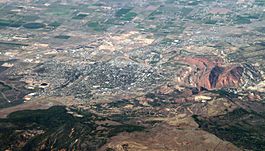Cedar Valley (Iron County, Utah) facts for kids
Quick facts for kids Cedar Valley |
|
|---|---|

Cedar Valley and Cedar City, November 2010
|
|
| Length | 25 mi (40 km) SW x NE |
| Geography | |
| Country | United States |
| State | Utah |
| Regions | Great Basin and Escalante Desert |
| County | Iron |
| Communities |
List
|
| Borders on |
List
|
| Lakes | Rush Lake and Quichapa Lake |
The Cedar Valley is a long valley in Iron County, Utah, United States. It stretches about 25 miles (40 km) from southwest to northeast. This valley is located in the southeast part of the county. It sits right against the Hurricane Cliffs. These cliffs are near the Cedar Mountains and the Markagunt Plateau.
The Escalante Desert is to the north and northwest of Cedar Valley. Cedar City, Utah is a main city in the valley. It is found in the center and eastern parts, at the base of the Hurricane Cliffs.
Exploring Cedar Valley's Geography
Cedar Valley mostly runs from the southwest to the northeast. In its southwestern part, the valley becomes narrower. Here, the Harmony Mountains are to the west. The Hurricane Cliffs are to the east, next to the Kolob Terrace.
The valley is usually about 6 to 8 miles (10 to 13 km) wide. This width is measured between the different mountain ranges or the Hurricane Cliffs. The Hurricane Cliffs are a very long landform, stretching about 75 miles (120 km) from Hurricane, Utah.
The northern and northwestern ends of the valley connect to the Mud Spring Wash and Rush Lake area. This area is southwest of the Black Mountains (Utah). It is also on the southeastern edge of the Escalante Desert. A ridge of hills extends southwest from the Black Mountains. This ridge runs parallel to the Hurricane Cliffs. It ends at the northern part of Cedar Valley, near Rush Lake.
Between this ridge and the Hurricane Cliffs to the east, you'll find Interstate 15. This highway passes through a narrow section, only about 1 mile (1.6 km) wide. This area is close to the old site of Summit. This route was also part of the historic Old Spanish National Historic Trail. The historic trail crosses Cedar Valley from Enoch in the northeast. It then goes through the center-north of the valley. Finally, it exits through the hills to the northwest, passing by the old town of Iron Springs.
Low Points and Lakes in the Valley
Quichapa Lake is a dry lake located in the south-central part of the valley. It is about 4 miles (6.4 km) northwest of Hamilton Fort. This lake gets water from small streams and washes. These come from the northwest, southwest, and southeast.
At the very north-northwest end of the valley, Mud Spring Wash flows northwest into the Escalante Desert. Rush Lake is an intermittent (sometimes dry) lake at the start of this wash. Rush Lake is next to the ridge coming from the Black Mountains. It is also in the lower part of a sloping area called Long Hollow.
Getting Around Cedar Valley
Interstate 15 (I-15) runs almost the entire length of Cedar Valley. It starts in the southwest and follows the eastern side of the valley, close to the Hurricane Cliffs. The highway then leaves the valley between the cliffs and a ridge from the Black Mountains. I-15 then enters the southwestern part of the Parowan Valley.
From the north, Utah State Route 130 (SR-130) travels south from Minersville. It goes through the Black Mountains. Then, it travels about 10 miles (16 km) through Long Hollow. Long Hollow is a sloped area of foothills between two ridges of the Black Mountains. This area meets the northern end of Cedar Valley. SR-130 then joins I-15 just north of Cedar City.
Utah State Route 56 (SR-56) crosses the middle of the valley from east to west. This route enters the south-central part of Cedar Valley. It runs between the Antelope Range to the north and the Harmony Mountains to the south. This route comes from Iron Mountain and Iron Mountain Wye in the mountains. In the Antelope Range, to the north, Iron Spring Road meets the valley's center-northwest. This road also comes from Iron Mountain, which is located between smaller peaks east of the Antelope Range.
The Lund Highway used to be called Utah State Route 19. It enters the northwestern part of the valley from Lund. Lund is located in the center of the Escalante Desert. It is about 30 miles (48 km) from the center of Cedar Valley.
 | Tommie Smith |
 | Simone Manuel |
 | Shani Davis |
 | Simone Biles |
 | Alice Coachman |


